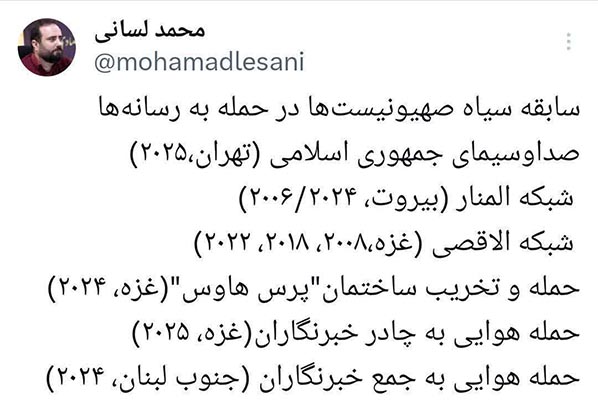
Hello Abroad
This Weblog is for Foreingers
Hello Abroad
This Weblog is for Foreingersسه شنبه های تحقیرآمیز مهاجرانی
خانم مهاجرانی، سخنگوی دولت پزشکیان، بلافاصله پس از بیان لیست شهدا تشکر کرد. بعد از جداسازی شهدای هسته ای از دیگر شهدا که داشت، ازش خواستند دوباره لیست را بیان کند و با ای مادر مادر گفتن گفت من میتونم دوباره بگم و باز شمرد و گفت ثبت رکورد دارین بنویسید.
با اشاره به غزه که فقط در حد یک اشاره انجام شد و بدون ذکر جنگی که رژیم صهیونی به عنوان عامل شهید شدن در جنگ، قحطی اجباری در جنگ غزه اعمال کرده، اعلام کرد که شرم بر کسانی که این صحنه ها را به تصویر میکشند. یعنی ما با کسی که این مشکلات را به وجود آورده مشکلی نداریم، مشکل ما با کسانیست که اینها رو تصویر میکشند!
ما چقدر دیگه بگیم که این خانم سخنگو هر بار چند پهلو حرف میزند؟ یعنی سخنگوی آلمان هم بود همینطور صحبت میکرد. آنها هم همین کلمات را استفاده میکنند. فرق کشور اسلامی که باید نگهدار جان مسلمانان باشد و جان آنها را نگهدارد با کشور آلمان که او هم میگوید هلال احمر باید غزه را جمع کند، معلوم نیست.
چه کسانی صحنه های غزه را به تصویر میکشند؟ خبرنگاران و فیلم برداران جبهه مقاومت
سخنگوی دولت که دیگر نباید هربار چند پهلو حرف بزند. اسم آمریکا و اسرائیل را نیاورد.
هر بار بهش میگیم چرا اینطوری صحبت میکنی؟ خودش را میکشه عقب که نه، منظورم این بود که چیز دیگر، منظورم رژیم صهیونی بود!
تا حد امکان سعیش این بود که اسم رژیم صهیونسیتی را نیاورد!
همچنین، مهاجرانی، خبر داد اگر ببینیم سازمانی عملکرد مناسبی را ندارد معنی اش این است که یکپارچگی کافی را ندارد. یعنی عزل و نصب های دولتی همچنان ادامه دارد و ایشان برای حفظ وفاق لازم است تعداد دیگری از افراد سازمانها را اخراج کرده و همفکران خودشان را در آن بگذارند.
پارسال از یک بازه زمانی چند ماهه تا موقع شهادت شهید رئیسی، رئیس جمهور ایران، منتظر بدترین اخبار برای کادر دولت رئیسی بودیم؛ خط مقدم جبهه نبرد علیه باطل شده بودند و یکباره هدف قرار گرفته بودن.
الان که جنگ دوازده روزه تمام شده و کلی فرمانده و دانشمند رده بالا و از اقشار مختلف شهید دادیم، از جمله ۱۲ نفر از اصحاب رسانه، همچنان نگران اصحاب رسانه هستیم که چرا که اسرائیل سو سابقه بلند بالایی در کشتار خبرنگاران و فیلم برداران دارد. او اصحاب رسانه را هدف قرار میدهد تا سرپوشی بر جنایاتش باشد و اصحاب رسانه را بخشی از اهداف نظامی ایران میداند.
_______________
Mrs. Mohajerani, the spokesperson for the government of Pezeshkian, thanked the doctors immediately after presenting the list of martyrs. After separating the nuclear martyrs from the other martyrs she had, she was asked to present the list again and she said, "Oh mother, mother, I can say it again," and she counted again and said, "You have a record to write down."
Referring to Gaza, which was only mentioned once and without mentioning the war in which the Zionist regime imposed a forced famine in the Gaza war as the cause of martyrdom, she declared that shame on those who depict these scenes. That is, we have no problem with those who created these problems, our problem is with those who depict them!
How much more can we say that this female spokesperson speaks in many ways every time? That is, she was the spokesperson for Germany, and she spoke in the same way. They also use the same words. The difference between an Islamic country that should protect the lives of Muslims and save their lives and Germany, which also says that the Red Crescent should collect Gaza, is unclear.
Who are filming the scenes in Gaza? Journalists and cameramen of the Resistance Front
The government spokesman who should no longer speak in a roundabout way every time. He did not mention the name of America or Israel.
Every time we ask him why he speaks like that? He pulls back and says no, I meant something else, I meant the Zionist regime!
He tried as much as possible not to mention the name of the Zionist regime!
Also, Mohajerani reported that if we see that an organization is not functioning properly, it means that it does not have sufficient integrity. This means that the dismissals and appointments of the government continue and in order to maintain unity, they need to dismiss a number of other people from the organizations and put their own like-minded people in it.
Last year, for a period of several months until the martyrdom of the martyred Raisi, the President of Iran, we were waiting for the worst news for the Raisi government cadre; the front line of the battle against had been nullified and they had been targeted all at once.
Now that the 12-day war is over and we have martyred a number of high-ranking commanders and scientists from various walks of life, including 12 members of the media, we are still concerned about the media because Israel has a long history of killing journalists and cameramen. It targets media members to cover up its crimes and considers media members to be part of Iran's military objectives.
وقتی عادی نبودن جرم است- ترور دانش
— به مناسبت سالروز شهادت نخبه و صاحبنظر در حوزه تحقیقات و فناوری هستهای، یک مرداد 1390، شهید داریوش رضایی نژاد این ویدئو را ببینید.
تا بدین روز شاهد تغییر رشته دانشجو های زیادی از رشته های مرتبط با تکنولوژی روز، به سایر رشته ها بوده ایم؛ جوانی ۱۸ ساله که تا دیروز رویایش کیهان شناسی بود، با دیدن چهره مغایر دانشگاه با مدرسه و تفاوت عرضه علم با آنچه که در کتابها میدیدی با یک تغییر رشته میشه جوانی با پوشش رنگی ورزشکاری.
او بارها شنیده و دیده که بسیاری از دکتراهای بیکار، با تمام استعداد و سختکوشیشان، سرانجامی جز بیکاری نداشتهاند؛ همانها که جامعه حتی زحمتهایشان را هم ندیده میگیرد و به طعنه «بی مهارت» میخواندشان.
از سوی دیگر، او جامعهای را میبیند که در آن برخی مدرکهای «فستفودی» گرفتهاند؛ بدون تلاش، بدون رنج علمآموزی، همانها که از همان دیپلم صاحب شغل بودند و امروز هم دانشجویان و پژوهشگران واقعی را به استهزا میگیرند. یکی از آنها با افتخار میگوید:
- ما بچه که بودیم جمع میشدیم زنگ در خانه یک دیوانه را بزنیم و او هم چون دیوانه بود روانی میشد و می افتاد دنبالمون و ما کیف میکردیم که از دست این دیوانه فرار کنیم! آن تحصیلکرده آنقدر درس خوانده که دیوانه شده!
اما، آرمیتا رضایی نژاد دختری که پدرش مقابل چشمان او تا دیروز عادی بود و با شش گلوله تروریست ها ۵۰۰۰ روز پیش دیگر آنجا نبود، تعریف میکند از آن روز به بعد او دیگر عادی نبود.
این عادی نبودن، آیا معنی روانی بودن میدهد؟
برخی اینطور تعبیر میکنند. خواسته و یا ناخواسته. برخی در زمین دشمن بازی میکنند، و برخی در کلام عامیانه میگویند که روانی شده اند!
آنچه که به مرور زمان شاهدش خواهیم بود چیست؟ ورای آن کلام عامیانه «روانی شدن» پس از واقعه؟ اینکه حق و حقوقت را نمیدهند و در عوض زنگ در خانه رو بعنوان یک کسی که غیرعادی هستی میزنند و در می روند! کاری که خودشان جلوی چشم دیگر تحصیلکرده ها کم تکرار نکرده اند.
از روزی که تجاوز رژیم صهیونی در میانه آنچه پروتکل روابط دیپلماتیک ایران با آمریکا خوانده میشد، در ۲۳ خرداد شروع شد، بشمارید چند نفر از فرهنگی های کشور را به اسم دانشمند و فرهنگی مقابل چشمان همکارانشان و یا خانواده هایشان شهید کردند و برای ما اینطور تعریف شد: و سپس او پس از این ماجرا روانی شد!
این است، جنگ روانی دشمن، پس از عملیات برنامه ریزی شده ترور دانشمندان. روایت این جنگ تا آنجا پیش میرود که حتی همکار شخص هم خودش از لفظ روانی شدنش پس از ترور استفاده میکند.
_________________________
— On the occasion of the anniversary of the martyrdom of the elite and expert in the field of nuclear research and technology, on July 23, 2011, Martyr Dariush Rezaeinejad, watch this video.
To this day, we have witnessed many students changing their majors from fields related to modern technology to other fields; an 18-year-old youth whose dream was cosmology until yesterday, upon seeing the contrasting face of the university with the school and the difference in the presentation of science with what you saw in books, becomes a young man with a colorful athletic coat with a change of major.
He has heard and seen many times that many unemployed PhDs, with all their talent and hard work, have had no end but unemployment; those whose efforts are not even noticed by society and sarcastically called "unskilled".
On the other hand, he sees a society in which some have obtained "fast food" degrees; Without effort, without the pain of learning, those who had jobs right from their diplomas and today still mock real students and researchers. One of them proudly says:
- When we were kids, we would gather to ring the doorbell of a madman, and because he was mad, he would go crazy and follow us, and we would try to escape from this madman! That educated person has studied so much that he has gone crazy!
However, Armita Rezaeinejad, a girl whose father was normal before her eyes until yesterday and was no longer there with six bullets from terrorists 5,000 days ago, explains that from that day on, he was no longer normal.
Does this not being normal mean being psychotic?
Some interpret it this way. Willingly or unwillingly. Some play on the enemy's turf, and some say in slang that they have gone psychotic!
What will we witness over time? Beyond that slang of "going psychotic" after the event? That they do not give you your rights and instead knock on the doorbell as if you are an abnormal being and leave! Something they have not repeated in front of other educated people.
Since the day the Zionist regime's aggression began in the midst of what was called the protocol of Iran's diplomatic relations with the United States, on June 23 2025, count how many people from the country's cultural elites were martyred in the name of scientists and cultural elites in front of their colleagues or families, and it was described to us like this: And then he became a psychopath after this incident!
This is the enemy's psychological warfare, after the planned operation to assassinate scientists. The narrative of this war goes so far that even the person's colleague himself uses the term "psychopath" after the assassination.
با خیانت کار وطن فروش چه کنیم؟
*معرفی منافق*
ـ فی صِفَةِ المُنافِقینَ ـ : حَسَدَةُ الرَّخاءِ، و مُؤَکِّدو (مُوَلِّد و) البَلاءِ، و مُقنِطو الرَّجاءِ
امام على علیه السلام ـ در معرّفى منافقان ـ فرمود:
- حسودانِ به آسایش [دیگران] هستند
- به گرفتارىِ [مردم ]دامن مى زنند
- و امید را به یأس مى کشانند
#نهج_البلاغه از «خطبه۱۹۴»
*افشای منافق*
به خدا سوگند! آن گاه که حق آشکار شد، تو ناتوان بودی و آواز تو آهسته بود و آن هنگام که باطل بانگ برآورد، چنان شاخ بز سر بر آوردی.
#نهج_البلاغه #امام_علی #خطبه۱۸۴
#اینهنگ #داستانان
*برخورد با منافق*
مردى که شمشیرهاى کین را بر قوم خود رهنمون شود و مرگ را بر سر آنان راند، سزاوار است، که خویشاوندانش او را دشمن دارند و بیگانگان از شر او ایمن ننشینند.
من (سید رضی) مى گویم: «عبارت مردى که شمشیر کین را بر قوم خود رهنمون شود» اشارت است به ماجراى اشعث با خالد بن ولید در یمامه. اشعث قوم خود را بفریفت و بر آنها مکر کرد و خالد از آنان کشتار بسیار کرد. از آن پس، قوم اشعث او را «عرف النّار» مى نامیدند و این نام را به کسى دهند که بر آنها غدر کرده باشد.
مدیریت امانت الهی
- و قَالَ (علیه السلام): وَ مَنِ اسْتَهَانَ بِالْأَمَانَةِ وَ رَتَعَ فِی الْخِیَانَةِ وَ لَمْ یُنَزِّهْ نَفْسَهُ وَ دِینَهُ عَنْهَا، فَقَدْ أَحَلَّ بِنَفْسِهِ الذُّلَّ وَ الْخِزْیَ فِی الدُّنْیَا وَ هُوَ فِی الْآخِرَةِ أَذَلُّ وَ أَخْزَى؛ وَ إِنَّ أَعْظَمَ الْخِیَانَةِ خِیَانَةُ الْأُمَّةِ وَ أَفْظَعَ الْغِشِّ غِشُّ الْأَئِمَّةِ
-و درود خدا بر او، فرمود:
هر که امانت را بى ارج شمارد و در مزرع خیانت چرد و خود و دین خود را از لوث آن پاکیزه نسازد، خود را در دنیا گرفتار خوارى و رسوایى ساخته و در آخرت خوارتر و رسواتر است. بزرگترین خیانت، خیانت به مسلمانان است و بزرگترین دغلکارى، دغلکارى با پیشوایان. والسلام.
بخشی از #نامه۲۶ نهج البلاغه
*برخورد امام با یاران هنگام خیانت در امانت*
- وقتی دیدى زمانه بر پسر عمویت سخت شد، و دشمن بر او کینه ورزید، و امانت مردم تباه شد،
- و این امّت به فتنه دچار و به خونریزى دلیر و پراکنده و بىپناه شدند،
- پیمانت را با پسر عمویت دگرگون نمودى، و همراه جدا شدگان از او جدا شدى، و با آنان که دست از یاریش برداشتند همراه گشتى،
-و با خیانت کنندگان به او خیانت نمودى نه با پسر عمویت همراهى نمود، نه امانت را ادا کردى.
-گویا تلاش براى خدا نبود، و انگار از جانب پروردگارت حجّتى نداشتى،
-و مثل اینکه در مقام بودى تا این امت را به خاطر اموالشان فریب دهى، و قصد داشتى غافلگیرشان کرده و بیت المال آنان را غارت کنى.
#نهج_البلاغه بخشی از #نامه۴۱ ، این نامه حضرت علی علیهالسلام به یکی از یارانشان، جناب عبداللَّه بن عباس، پسر عمو، نوشته اند. (وقتی خطایی از او سر زد، مقداری از اموال بیت المال را که فکر کرده بود سهم او میشود، برداشته و به سفر مکّه رفته بود)
به #داستانان بپیوندید:
_________________________________________
*Definition of the hypocrite*
- In the characteristics of the hypocrites: Envious of prosperity, certain of calamity, and desirous of hope
Imam Ali (peace be upon him) said in his definition of the hypocrites:
- They are envious of the comfort of [others]
- They flatter [people's] misfortune
- And they turn hope into despair
#Nahj_Balaghah from "Sermon 194"
*Exposing the hypocrite*
By God! When the truth became clear, you were weak and your voice was low, and when falsehood shouted, you raised your head like a goat's horn.
#Nahj_Balagha #Imam_Ali #Sermon184
#Inhang #Stories
*Confrontation with the Hypocrite*
A man who directs the swords of hatred against his people and brings death upon them deserves that his relatives be his enemies and that strangers will not be safe from his evil.
I (Sayyid Razi) say: “The phrase ‘a man who directs the sword of hatred against his people’ is a reference to the incident between Ash’ath and Khalid ibn Walid in Yamamah. Ash’ath deceived his people and plotted against them, and Khalid killed many of them. From then on, Ash’ath’s people called him “Araf al-Nar” and this name is given to someone who has betrayed them.
Management of divine trust
- And he (peace be upon him) said: And he who despises trust and recoils from betrayal and does not sacrifice his soul and his religion for it, he has lost the right. His soul is humiliated and humiliated in this world and he is humiliated and humiliated in the Hereafter; And indeed, the greatest betrayal is the betrayal of the nation, and the most terrible betrayal is the betrayal of the nation
-And may God’s peace and blessings be upon him, he said:
Whoever despises trust and indulges in treachery and does not purify himself and his religion from its taint, will have incurred humiliation and disgrace in this world and will be even more humiliated and disgraced in the Hereafter. The greatest betrayal is betrayal of the Muslims, and the greatest betrayal is betrayal of the leaders. Peace be upon him.
Part of #Letter26 of Nahjul-Balagha
*The Imam's Dealing with Companions When Betrayed in Trust*
- When you saw that times had become difficult for your cousin, and the enemy had taken a grudge against him, and the trust of the people had been ruined,
- And this nation had been afflicted with sedition and bloodshed, brave and scattered, and without shelter,
- You changed your covenant with your cousin, and you separated from him with those who separated, and you accompanied those who stopped helping him,
- And you betrayed him with those who betrayed him, and you did not accompany your cousin, nor did you fulfill the trust.
- As if there was no effort for God, and as if you had no proof from your Lord,
- And as if you were in a position to deceive this nation about their wealth, and you intended to surprise them and plunder their treasury.
#Nahj_Balagha is part of #Letter41, this letter was written by Imam Ali (a.s.) to one of his companions, Abdullah bin Abbas, his cousin. (When he made a mistake, he took some of the property of the treasury, which he thought was his share, and went on a journey to Mecca)
Join #Dastanan:
https://eitaa.com/dastanan
نقشه فینیقیه باستان و شام پس از حمله اسرائیل
داشتم مطلبی درباره جبران خلیل جبران میخوندم که سندی شده بود بر آغاز تجاوز اسرائیل به کشورشان. جبران خلیل جبران، یک فینیقی بود از جنس هم دوره ای های خودش: آشنا به تجارت، بورس و در جستجوی گشایش زندگی
شخصیتی مشابه ما داشت که برای بازگشت به خود و جامعه ساحل شامات قدیم راهی نیویورک میشه، و باز برمیگرده و زبان عرب میخونه و باز راهی سفری در مهاجرت میشه.
نامه به عربی نوشته بود به دوستش که تو رو دیشب در خواب دیدم که غرق در خون شده بودی و این آغاز جنگ با اسرائیل و اشغال گری آن بود.
جبران خلیل جبران چند زبانه شد و همواره در جستجوی تمدن کشور و زادگاهش فلسطین بود.
البته، فینیقی ها چه کسانی بودند؟
همانطور که گفتم ساحل شامات، شامل فینیقیه باستان بود. در نقشه های قدیم فینیقیه در منطقهای واقع شده بود که امروزه شامل لبنان، بخشهایی از سوریه و فلسطین است. این منطقه دارای سواحل طولانی و حاصلخیز بود که امکان توسعه تجارت دریایی را فراهم میکرد.
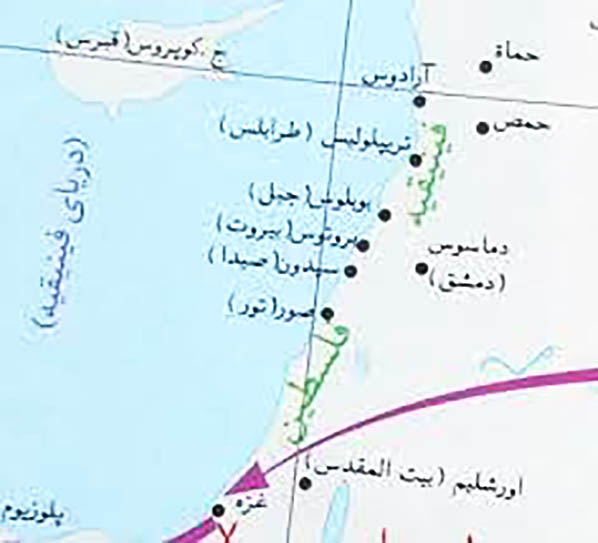
• فینیقیها به دلیل مهارتشان در دریانوردی و بازرگانی، در سراسر جهان باستان شناخته شده بودند. تمدن آنها به پیش از دوره هخامنشیان ایران باز میگردد.
• شهرهای مهم فینیقی شامل صور، صیدون، بیروت و جبله بودند.
• دریای فینیقیه: اشاره به منطقهٔ ساحلی شام (لبنان + فلسطین+ سوریه) که محل سکونت فینیقیها بوده است. آنها به عنوان ملوانان و بازرگانان ماهر شناخته میشدند.
سایر دریاها در ارتباط با این تمدن عبارتند از:
• دریای اژه: دریایی در شرق دریای مدیترانه که جزایر و سواحل یونان و ترکیه را در بر میگیرد.
• دریای مرمره: دریای کوچکی در شمال غربی ترکیه که استانبول را در خود جای داده است.
• دریای سیاه: دریایی در شرق اروپا و غرب آسیا.
• دریای اژه و سواحل آسیای صغیر: اشاره به منطقهٔ وسیعی در شرق مدیترانه که شامل یونان و ترکیه امروزی میشود.
• دریای مرمره (پروپونتیس): نام یونانی دریای مرمره است.
• دریای سیاه: دریایی در شرق اروپا و غرب آسیا.
• هلسپونتوس: نام یونانی داردانل است.
• کوپروس (Cyprus): قبرس امروزی که جزیرهای در شرق مدیترانه که از نظر تجاری و استراتژیک برای فینیقیها مهم بود.
• صیدا: یکی از مهمترین شهرهای فینیقی در ساحل لبنان کنونی که نقش کلیدی در تجارت دریایی این منطقه داشت.
• یونان باستان: این متن اشاره میکند که با توجه به فعالیتهای فینیقیها، دنیای یونان باستان بسیار وسیعتر از شبهجزیره یونان بوده است.
فینیقیها به عنوان دریانوردان و بازرگانان ماهر، با ایجاد شبکههای تجاری گسترده، کالاهای مختلفی را از شرق تا غرب مدیترانه مبادله میکردند. آنها مستعمراتی در مناطق مختلف مدیترانه ایجاد کردند که از جمله مهمترین آنها، شهر کارتاژ در شمال آفریقا بود.
ساحل فینیقی با تجاوز انگلیس، قبل از آنچه که امروز اسرائیل خوانده میشود، بخشی از شام معرفی شده در تاریخ اسلام بوده است. آن زمان که در نوحه ها برای حضرت رقیه میخوانیم که او را به شام در تبعید بردند، به دمشق امروزی اشاره میکند.
سواحل شام در درگیری ها به دو بخش فینیقیه که امروز به آن لبنان میگویند تقسیم شد و فلسطین. فلسطین تا قبل از تجاوز اسرائیل تحت سلطه انگلیس به صورت خودمختار اداره میشد.
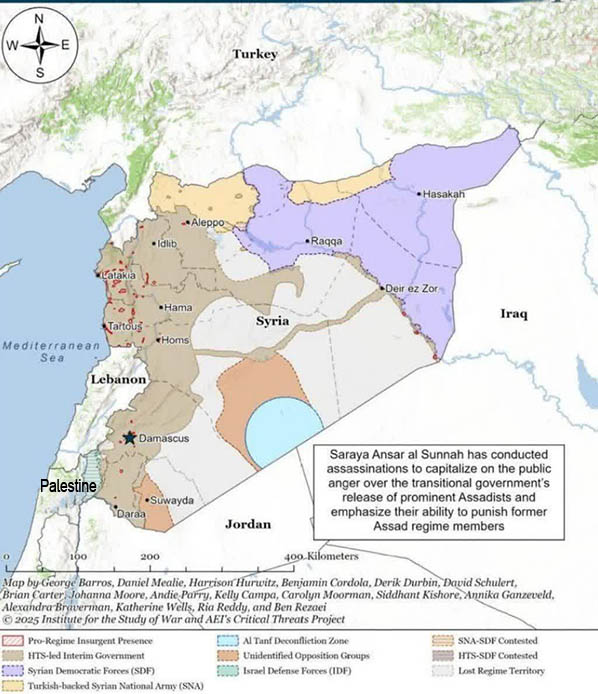
اسرائیل یک منطقه کوچک در خط ساحلی را در روز نکبت به نام خود کرد و پس از آن با برنامه ریزی در حد یک قرن به تجاوز، ترور و دست اندازی در منطقه پرداخت. او که خط استعماری انگلیسی زبانان بود با کمک آمریکا نقشه متفاوتی از شام دیروز و سوریه امروز به این صورت ارائه کرد:
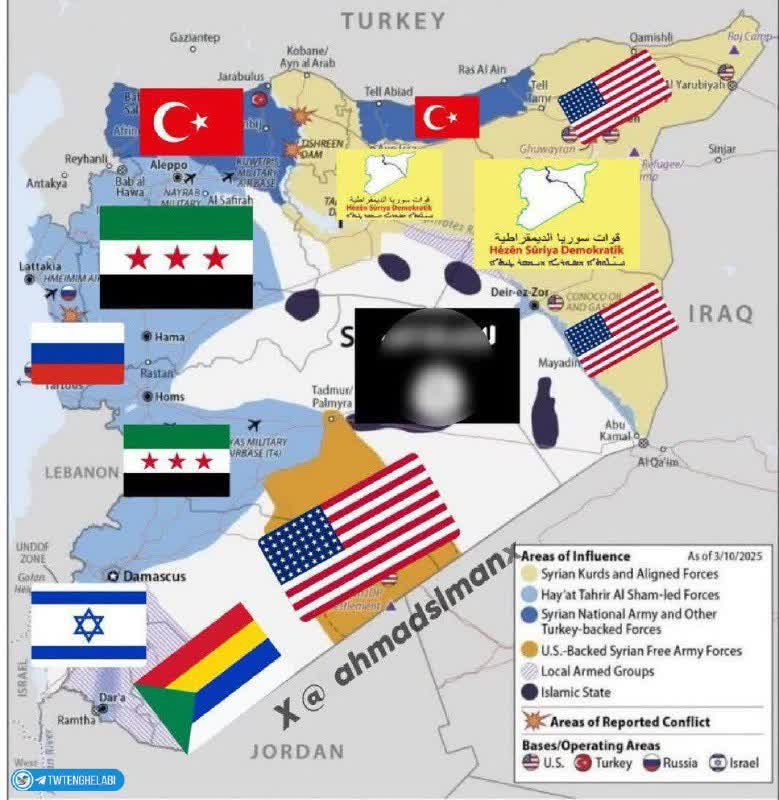
در ادامه این نقشه، با پروژه براندازی حکومت ایران، موشک بر سر مردم ریخت تا در جنگ 12 روزه، دستش به خون کودکان ایرانی نیز آغشته باشد:
در این تصویر میبینید که روی موشک نوشته اسرائیل به نام مهسا امینی، کودکان و نوزادان ایرانی را به شهادت رسانده است:
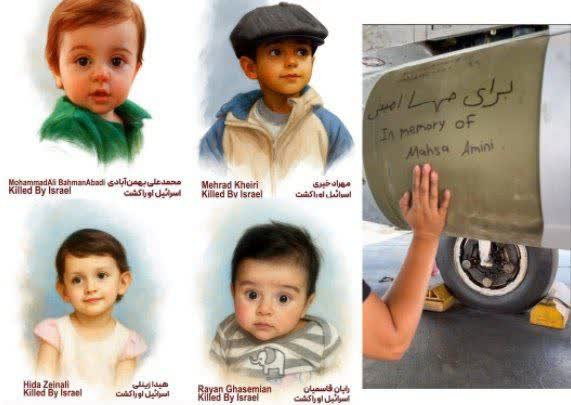
اسرائیل به فقط ریختن بمب مهسا امینی و اغتشاشات مربوط به آن اکتفا نکرد و مادر و جنین را هم شهید کرد:
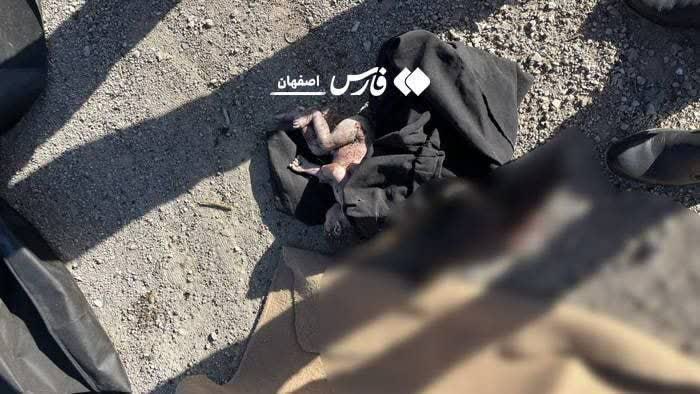
گفتنی است، در این جنگ، اسرائیل به جز خاک سوریه و عراق و قطر از خاک جمهوری آذربایجان نیز برای حملات ددمنشانه خود بهره برده است:
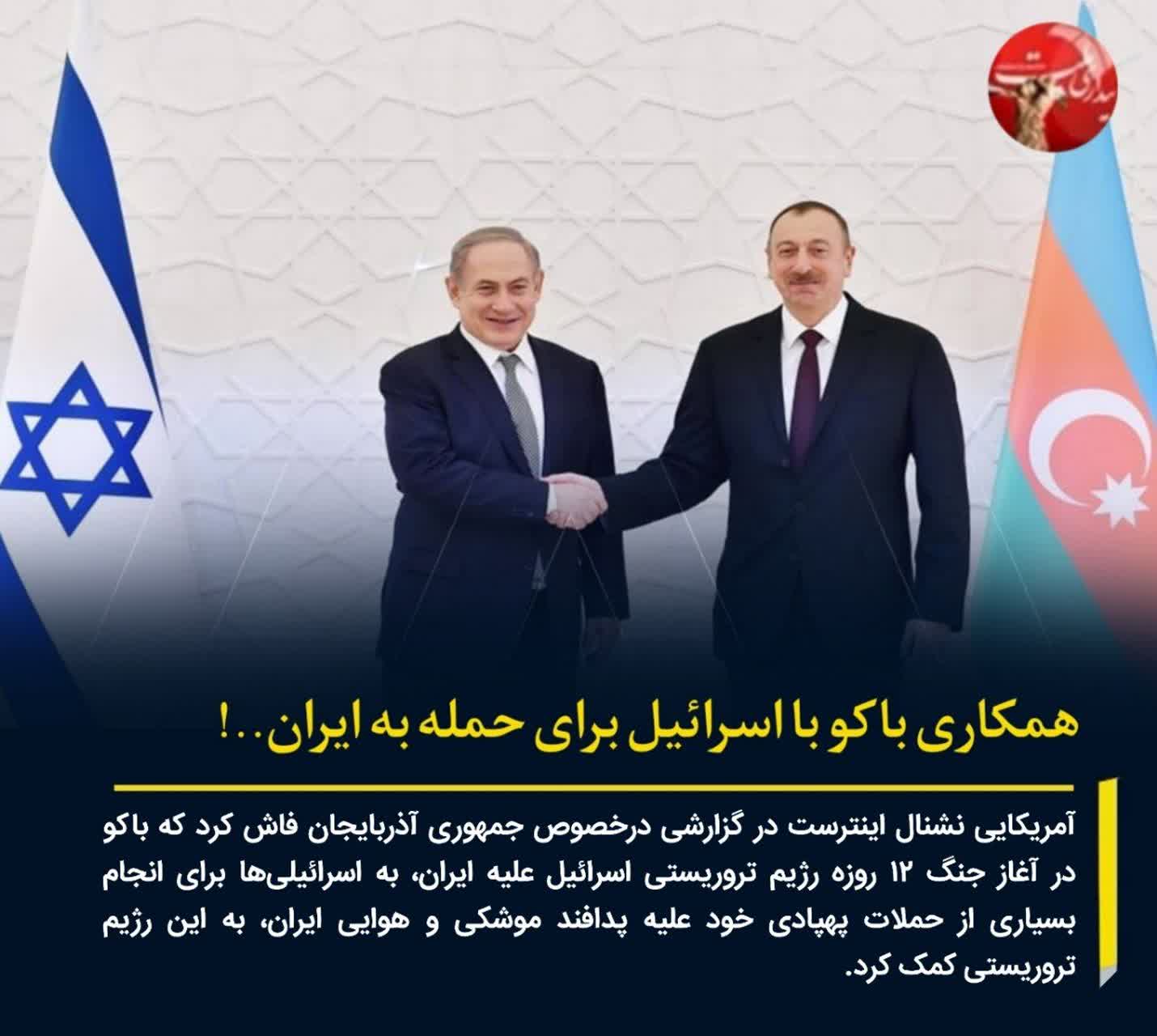
در این براندازی حکومت، از ریختن بمب بر سر رسانه صداو سیمای ایران هم دریغ نکرد و با شهادت 12 نفر از اهالی رسانه در خاک ایران، وارد فاز جدیدی از عملیات براندازی با حمایت داخلی و شخصیت هایی مانند میرحسین موسوی وارد کار شد:
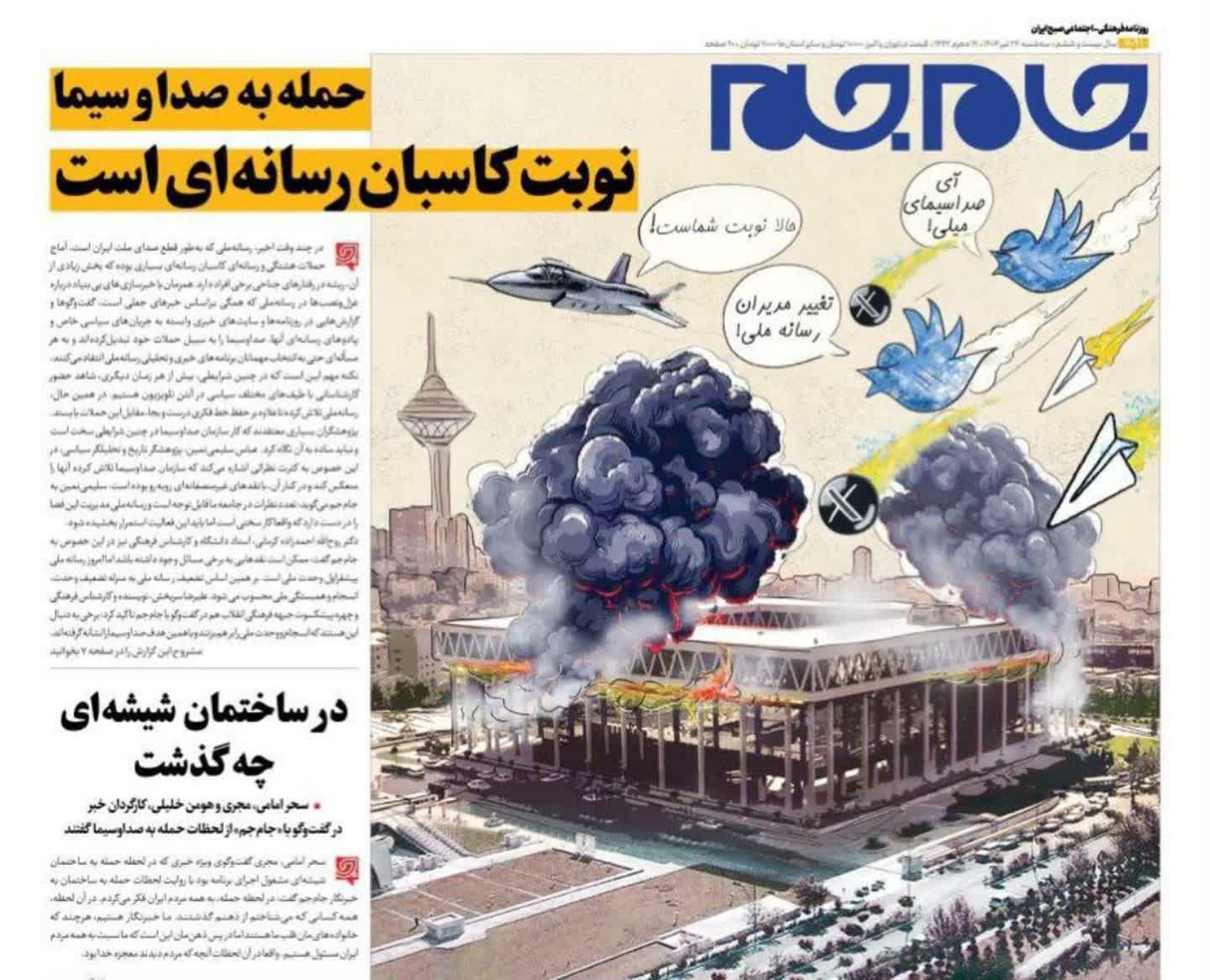
_________________________________
I was reading an article about Gibran Khalil Gibran that documented the beginning of Israel's invasion of their country. Gibran Khalil Gibran was a Phoenician of his contemporaries: familiar with trade, the stock market, and in search of an opening in life.
He had a personality similar to ours, who went to New York to return to himself and the society of the ancient Levant coast, and then returned and studied Arabic, and then set off on another journey of emigration.
He had written a letter in Arabic to his friend that "I saw you in a dream last night that you were covered in blood", and this was the beginning of the war with Israel and its occupation.
Gibran Khalil Gibran became multilingual and was always in search of the civilization of his country and birthplace, Palestine.
Of course, who were the Phoenicians?
As I said, the Levant coast included ancient Phoenicia. On ancient maps, Phoenicia was located in an area that today includes Lebanon, parts of Syria, and Palestine. This area had long and fertile beaches that allowed for the development of maritime trade.
• The Phoenicians were known throughout the ancient world for their seafaring and trading skills. Their civilization dates back to before the Achaemenid period of Iran.
• Important Phoenician cities included Tyre, Sidon, Beirut, and Jabaleh.
• Phoenician Sea: Refers to the coastal region of the Levant (Lebanon + Palestine + Syria) where the Phoenicians lived. They were known as skilled sailors and traders.
Other seas associated with this civilization include:
• Aegean Sea: A sea in the eastern Mediterranean Sea that includes the islands and coasts of Greece and Turkey.
• Sea of Marmara: A small sea in northwestern Turkey that includes Istanbul.
• Black Sea: A sea in eastern Europe and western Asia.
• Aegean Sea and the coast of Asia Minor: Refers to a large area in the eastern Mediterranean that includes modern-day Greece and Türkiye.
• Sea of Marmara (Propontis): The Greek name for the Sea of Marmara.
• Black Sea: A sea in eastern Europe and western Asia.
• Hellespont: The Greek name for the Dardanelles.
• Cyprus: Modern-day Cyprus, an island in the eastern Mediterranean that was important to the Phoenicians in terms of trade and strategy.
• Sidon: One of the most important Phoenician cities on the coast of present-day Lebanon, which played a key role in the maritime trade of the region.
• Ancient Greece: This text indicates that, due to the activities of the Phoenicians, the ancient Greek world was much wider than the Greek peninsula.
As skilled seafarers and merchants, the Phoenicians traded various goods from the east to the west of the Mediterranean by establishing extensive trade networks. They established colonies in various parts of the Mediterranean, among the most important of which was the city of Carthage in North Africa.
The Phoenician coast, before the British invasion of what is now Israel, was part of the Levant as defined in Islamic history. The time when we read in the laments for the Prophet Ruqayyah that she was taken into exile to Levant, refers to present-day Damascus.
The Levant coast was divided in the conflicts into two parts: Phoenicia, which is now Lebanon, and Palestine. Palestine was governed autonomously under British rule until the Israeli invasion.
Israel claimed a small area of the coastline on the Day of the Catastrophe and then, with planning for a century, began to invade, terrorize, and encroach on the region. He, who was the colonialist line of the English-speaking people, presented a different map of yesterday's Syria and today's Syria with the help of America as follows:
Following this map, with the project of overthrowing the Iranian government, he dropped missiles on the people so that in the 12-day war, his hands would also be stained with the blood of Iranian children:
In this picture, you can see that the missile says Israel has martyred Iranian children and infants named Mahsa Amini:
Israel did not stop at dropping the bomb on Mahsa Amini and the riots related to it, it also martyred the mother and fetus:
It is worth mentioning that in this war, Israel, in addition to the territory of Syria, Iraq and Qatar, has also used the territory of the Republic of Azerbaijan for its brutal attacks:
In this overthrow of the government, it did not hesitate to drop bombs on the Iranian Radio and Television, and with the martyrdom of 12 media people in Iranian territory, it entered a new phase of the overthrow operation with domestic support and personalities such as Mir Hossein Mousavi:
از موشک میدان تجریش تا بستن تنگه هرمز و آغاز دور دوم نبرد
بازسازی واقعه میدان تجریش، اینبار از پنجره خانه ما
همه چیز خیلی سریع اتفاق افتاد. حوالی ظهر بود و من در پاگرد پلههای ساختمان مسکونی مستأجری که وسط بازار و مشرف به میدان بود، مشغول تمیز کردن خاک و غبار و جابهجا کردن پرندهای بودم که بدجایی، درست پشت پنجرهای که رو به خیابان باز میشد، لانه کرده بود.
ناگهان صدای یا حسین، محکم و پرصلابت از خیابان بلند شد. فاصلهای بین آن صدا و انفجاری که درست وسط میدان رخ داد، نبود. پرندهای که در دستم بود و پنجرهای که حالا شیشههای شکستهاش مثل ترکش به سمتم میآمد، فقط به من یک فرصت داد: فرار.
موج انفجار که خوابید، باز هم صدای یا حسین از بیرون میآمد. داخل خانه اما، لکههای خون اینجا و آنجا پخش بود. نمیدانستم خونِ من است یا از پرندهای که در دست داشتم یا شاید پرندههای دیگری که جایی در طبقه پنهان بودند و من ندیده بودم.
همهچیز چنان سریع رخ داد که شوکه شده بودم. قلبم تند میزد و بدنم داغ شده بود. در یک حالت نیمهفرار و گیجی، انگار بدنم را نمیشناختم اما ذهنم صحنه را مدام به عقب میبرد؛ مثل فیلمی که بارها مرورش کنی تا جزئیاتش را بفهمی: صدای یا حسین، شیشههای شکسته، موج انفجار، لکههای خون.
بعدها فهمیدم آن لحظه دو انفجار در میدان رخ داده بود. انفجار اول، صدای یا حسین را در خیابان بلند کرده بود و انفجار دوم، درست در نزدیکی خانه ما، باعث ترکیدن لوله بزرگ آب زیر میدان شد. آب مثل رودخانه در همه جا جاری شد. چند ماشین که وسط میدان بودند به هوا پرتاب شدند و زیر آوار له شدند. تعدادی هم شهید شدند که جنازههایشان اطراف میدان پیدا شد. این بود کل ماجرا.
خوشبختانه ماشینم را کنار ساختمان پارک نکرده بودم و در پارکینگ طبقاتی گذاشته بودم. در اولین فرصت سوار ماشین شدم، رفتم ترمینال و از آنجا راهی قم شدم.
مدتی در مرکز اقامتی تفریحی دوستان مشغول بودم. آنجا برای مهمانان پکهای کیک بادامزمینی، پرتقالی و کاکائویی آماده میکردند و در یخچال واحدها میگذاشتند. سرشان خیلی شلوغ بود و بین آنهمه آدم، من هم گم میشدم. بعد از پایان جنگ ۱۲ روزه، هر کسی به کار و زندگیاش برگشت.
سرِ کار من هم رفتن به مدرسه بود. مدرسه در تابستان فعال بود تا خودش را برای سال تحصیلی جدید آماده کند. آنجا پنکیک جدیدی پختیم و امتحان کردیم. یکی از مدیران مدرسه دیگر که آمده بود، پیشنهاد داد پنکیکها را با بیسکوئیت سرو کنیم.
وقتی بشقابها را روی اوپن میچیدیم، همان مدیر آمد و راز موفقیتش را برایمان گفت: روزی یک کاسه از یک کرم تیوپی مخصوص به صورتش میمالد و همان لحظه هم نشانمان داد. من هم کنجکاو شدم و کمی امتحان کردم. کرم به سرعت جذب میشد. بقیه دوستان هم امتحان کردند. من گفتم این حتماً خیلی گران است و ما از پس خریدش برنمیآییم.
او همانطور که چادر و مقنعه پوشیده بود و کیفش را روی دوش انداخت، گفت: «نه، فقط پنجاه تومنه!» من فکر میکردم میلیونها تومان قیمت دارد!
تا بعد از ظهر آنجا ماندیم. ظرفهای زیادی جمع شده بود و کنارشان تبلیغات مدارس را چیده بودند. یکی از تبلیغها برای یک هنرستان بود که زنجیر قلبی بدلی بزرگی را به تابلوی سبزش آویزان کرده بود تا بیشتر جلب توجه کند.
داشتم آن را نگاه میکردم که یکی با دستور تولید آدامس جدید آمد و بعد هم باهم رفتیم سراغ تمیز کردن بشقابها.
بعد از اتمام کار ما، گروه دیگری آمدند؛ گروهی که برای شرایط جنگی و بستن تنگه هرمز برنامهریزی کرده بودند. پشت دو تلویزیون در یکی از کلاسها نشستند و حمله را اجرا کردند. همه چیز خیلی عادی به نظر میرسید. اما بلافاصله ارتباط تلویزیونی قطع شد و فقط دو خط سفید روی صفحه سیاه باقی ماند. یک پیام مدام تکرار میشد:
It's war farm. It's war farm.
همه اینها پیشبینی شده بود. حتی قطع رسانه. با شروع نبرد، تنگه هرمز به صورت خودکار بسته شده بود و رسانهها هم خودبهخود تعطیل شدند.
پ.ن: جنگ 12 روزه، با آغاز تجاوز اسرائیل 25 خرداد، با یک شبیخون شروع شد.
بیش از 1100 نفر شهید و 5000 معلول و جانباز تلفات انسانی جنگ بود:
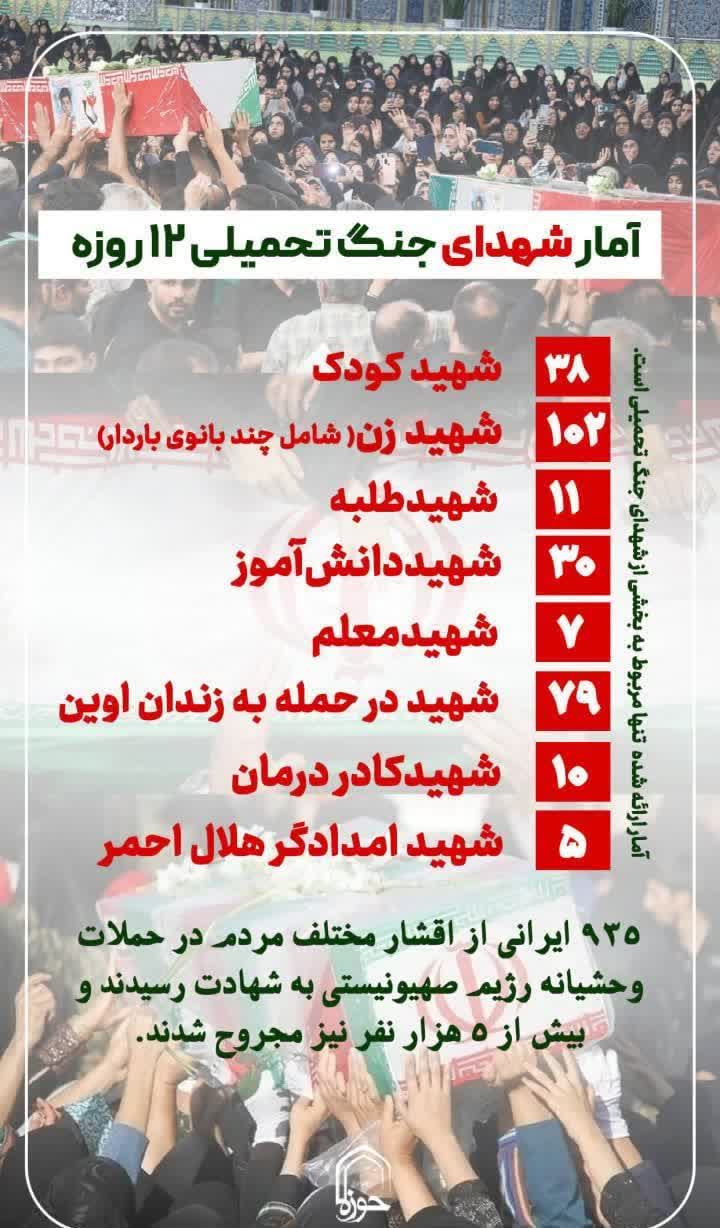
در این جنگ ساختمان شیشه ای صداسیما هنگامی که پخش زنده داشت جلوی اذهان عمومی مورد حمله موشکی اسرائیل قرار گرفت و کل آن به کلی سوخت. در این جنگ 12 شهید رسانه داریم. اسرائیل سابقه سیاهی در حمله به اصحاب رسانه دارد:
حمله به صداسیما، شبکه المنار، شبکه الاقصی، حمله به چادر خبرنگاران غزه، حمله به جمع خبرنگاران لبنان و صدها حمله دیگر.
